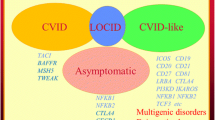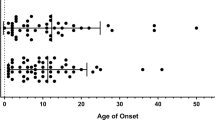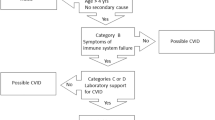Abstract
Common variable immunodeficiency disorders (CVIDs) are rare primary immunodeficiency diseases (PIDs) mostly associated with late onset antibody failure leading to immune system failure. Patients with CVID are predisposed to disabling complications such as bronchiectasis and systemic autoimmunity. In recent years a large number of genetic defects have become associated with these disorders. Patients with a causative mutation are deemed to have CVID-like disorders, while those with mutations predisposing to or modifying disease severity remain within the spectrum of CVID as defined by current diagnostic criteria. Next-generation sequencing (NGS) allows simultaneous analysis of multiple genes. Potential mutations identified from NGS are commonly evaluated with the American College of Medical Genetics (ACMG) variant interpretation criteria to determine their pathogenicity (causality). Patients with CVID and CVID-like disorders have marked genetic, allelic, and phenotypic heterogeneity. Although all patients with a CVID phenotype should undergo genetic testing, the complexity of the genetics associated with these disorders is challenging. Variants of unknown significance (VUS) remain a significant barrier to realising the full potential of NGS in CVID and CVID-like disorders. Here we explore the nuances of applying the ACMG criteria to patients with CVID and CVID-like disorders. Close collaboration between the clinician, bioinformatics, and genetics professionals will improve the diagnostic yield from genetic testing and reduce the frequency of VUS.
Similar content being viewed by others
References
Tangye SG, Al-Herz W, Bousfiha A et al (2020) Human inborn errors of immunity: 2019 update on the classification from the International Union of Immunological Societies Expert Committee. J Clin Immunol 40:24–64
Abbott JK, Gelfand EW (2015) Common variable immunodeficiency : diagnosis, management, and treatment. Immunol Allergy Clin North Am 35:637–658
Ameratunga R (2019) Assessing Disease Severity in Common Variable Immunodeficiency Disorders (CVID) and CVID-Like Disorders Front Immunol 9
Ameratunga R, Lehnert K, Woon ST et al (2019) All patients with common variable immunodeficiency disorders (CVID) should be routinely offered diagnostic genetic testing. Front Immunol 10:2678
Ameratunga R, Becroft DM, Hunter W et al (2000) The simultaneous presentation of sarcoidosis and common variable immune deficiency. Pathol 32:280–282
Azizi G, Abolhassani H, Asgardoon MH et al (2017) Autoimmunity in common variable immunodeficiency: epidemiology, pathophysiology and management. Expert Rev Clin Immunol 13:101–115
Ameratunga R, Ahn Y, Steele R, Woon S-T et al (2019) The natural history of untreated primary hypogammaglobulinemia in adults: implications for the diagnosis and treatment of Common Variable Immunodeficiency Disorders (CVID). Front Immunol 17(10):1541
Ameratunga R, Ahn Y, Tse D et al (2019) The critical role of histology in distinguishing sarcoidosis from common variable immunodeficiency disorder (CVID) in a patient with hypogammaglobulinemia. Allergy Asthma Clin Immunol 15:78
Selenius JS, Martelius T, Pikkarainen S et al (2017) Unexpectedly high prevalence of common variable immunodeficiency in Finland. Front Immunol 8:1190
Tseng CW, Lai KL, Chen DY, Lin CH, Chen HH et al (2015) The incidence and prevalence of common variable immunodeficiency disease in Taiwan. A Population-Based Study PloS one 10:e0140473
Ameratunga R, Woon ST (2019) Perspective evolving concepts in the diagnosis and understanding of common variable immunodeficiency disorders (CVID) Clin Rev Allergy Immunol (in press)
Ameratunga R, Brewerton M, Slade C et al (2014) Comparison of diagnostic criteria for common variable immunodeficiency disorder. Front Immunol 5:415
Ameratunga R, Woon ST, Gillis D, Koopmans W, Steele R et al (2013) New diagnostic criteria for common variable immune deficiency (CVID), which may assist with decisions to treat with intravenous or subcutaneous immunoglobulin. Clin Exp Immunol 174:203–211
Ameratunga R, Woon ST, Gillis D, Koopmans W, Steele R et al (2014) New diagnostic criteria for CVID. Expert Rev Clin Immunol 10:183–186
Ameratunga R, Allan C, Woon ST et al (2020) Defining common variable immunodeficiency disorders in 2020. Immunol Allergy Clin North Am 40:403–420. https://doi.org/10.1016/j.iac.2020.03.001 (Epub Jun 7)
Ameratunga R, Lehnert K, Woon ST et al (2018) Review: diagnosing common variable immunodeficiency disorder in the era of genome sequencing. Clin Rev Allergy Immunol 54:261–268
Grimbacher B, Hutloff A, Schlesier M et al (2003) Homozygous loss of ICOS is associated with adult-onset common variable immunodeficiency. Nat Immunol 4:261–268
Schepp J, Chou J, Skrabl-Baumgartner A et al (2017) 14 years after discovery: clinical follow-up on 15 patients with inducible co-stimulator deficiency. Front Immunol 8:964
Salzer U, Chapel HM, Webster AD et al (2005) Mutations in TNFRSF13B encoding TACI are associated with common variable immunodeficiency in humans. Nat Genet 37:820–828
Pan-Hammarstrom Q, Salzer U, Du L et al (2007) Reexamining the role of TACI coding variants in common variable immunodeficiency and selective IgA deficiency. Nat Genet 39:429–430
Koopmans W, Woon ST, Brooks AE, Dunbar PR, Browett P, Ameratunga R et al (2013) Clinical variability of family members with the C104R mutation in transmembrane activator and calcium modulator and cyclophilin ligand interactor (TACI). J Clin Immunol 33:68–73
Ameratunga R, Koopmans W, Woon ST et al (2017) Epistatic interactions between mutations of TACI (TNFRSF13B) and TCF3 result in a severe primary immunodeficiency disorder and systemic lupus erythematosus. Clin Transl Immunol 6:e159
Ameratunga R, Gillis D, Steele R et al (2016) Diagnostic criteria for common variable immunodeficiency disorders. J Allergy Clin Immunol Pract 4:1017–1018
Bonilla FA, Barlan I, Chapel H et al (2016) International Consensus Document (ICON): common variable immunodeficiency disorders. J Allergy Clin Immunol Pract 4:38–59
Seidel MG, Kindle G, Gathmann B et al (2019) The European Society for Immunodeficiencies (ESID) Registry Working Definitions for the Clinical Diagnosis of Inborn Errors of Immunity. J Allergy Clin Immunol Pract
Bogaert DJ, Dullaers M (2016) Lambrecht BN Vermaelen KY De Baere E Haerynck F Genes associated with common variable immunodeficiency one diagnosis to rule them all? J Med Genet
Abolhassani H, Hammarstrom L (2020) Cunningham-Rundles C Current genetic landscape in common variable immune deficiency. Blood
Fliegauf ML, Bryant V, Frede N et al (2015) Haploinsufficiency of the NF-κB1 Subunit p50 in common variable immunodeficiency. Am J Hum Genet 97:389–403
Chen K, Coonrod EM, Kumánovics A et al (2013) Germline mutations in NFKB2 implicate the noncanonical NF-κB pathway in the pathogenesis of common variable immunodeficiency. Am J Hum Genet 93:812–824
Maffucci P, Filion CA, Boisson B et al (2016) Genetic diagnosis using whole exome sequencing in common variable immunodeficiency. Front Immunol 7:220
Ameratunga R, Woon ST, Brewerton M et al (2011) Primary immune deficiency disorders in the South Pacific: the clinical utility of a customized genetic testing program in New Zealand. Ann N Y Acad Sci 1238:53–64
Ameratunga R, Woon ST, Neas K, Love DR et al (2010) The clinical utility of molecular diagnostic testing for primary immune deficiency disorders: a case based review. Allergy Asthma Clin Immunol 6:12
Richards S, Aziz N, Bale S et al (2015) Standards and guidelines for the interpretation of sequence variants: a joint consensus recommendation of the American College of Medical Genetics and Genomics and the Association for Molecular Pathology. Genet Med 17:405–424
Gayden T, Sepulveda FE, Khuong-Quang DA et al (2018) Germline HAVCR2 mutations altering TIM-3 characterize subcutaneous panniculitis-like T cell lymphomas with hemophagocytic lymphohistiocytic syndrome. Nat Genet 50:1650–1657. https://doi.org/10.0038/s41588-018-0251-4 (Epub 2018 Oct 29)
Strande NT, Brnich SE, Roman TS, Berg JS et al (2018) Navigating the nuances of clinical sequence variant interpretation in Mendelian disease. Genet Med 20:918–926
Gruber C, Bogunovic D (2020) Incomplete penetrance in primary immunodeficiency a skeleton in the closet. Hum Genet
Gathmann B, Mahlaoui N, Gerard L et al (2014) Clinical picture and treatment of 2212 patients with common variable immunodeficiency. J Allergy Clin Immunol 134:116–126
Woon ST, Ameratunga R, Croxson M et al (2008) Follicular lymphoma in a X-linked lymphoproliferative syndrome carrier female. Scand J Immunol 68:153–158
Ameratunga R, Ahn Y, Jordan A, Lehnert K, Brothers S, Woon ST (2018) Keeping it in the family: the case for considering late onset combined immunodeficiency a subset of common variable immunodeficiency disorders. Expert Rev Clin Immunol 14:549–556
Lorenzini T, Fliegauf M, Klammer N et al (2020) Characterization of the clinical and immunological phenotype and management of 157 individuals with 56 distinct heterozygous NFKB1 mutations. J Allergy Clin Immunol 9:051
Rodriguez-Cortez VC, Del Pino-Molina L, Rodriguez-Ubreva J et al (2015) Monozygotic twins discordant for common variable immunodeficiency reveal impaired DNA demethylation during naive-to-memory B-cell transition. Nat Commun 6:7335
Ameratunga R, Woon ST, Bryant VL et al (2018) Clinical Implications of Digenic inheritiance and epistasis in Primary Immunodeficiency Disorders. Front Immunol 8:1965
Nykamp K, Anderson M, Powers M et al (2017) Sherloc: a comprehensive refinement of the ACMG-AMP variant classification criteria. Genet Med 19:1105–1117
Haer-Wigman L, van der Schoot V, Feenstra I et al (2019) 1 in 38 individuals at risk of a dominant medically actionable disease. Eur J Hum Genet 27:325–330
Chinn IK, Chan AY, Chen K et al (2020) Diagnostic interpretation of genetic studies in patients with primary immunodeficiency diseases: a working group report of the Primary Immunodeficiency Diseases Committee of the American Academy of Allergy, Asthma & Immunology. J Allergy Clin Immunol 145(1):46–69. https://doi.org/10.1016/j.jaci.2019.09.009 (Epub 2019 Sep 27)
Author information
Authors and Affiliations
Corresponding author
Ethics declarations
Conflict of Interest
The authors declare that they have no competing interests.
Additional information
Publisher’s Note
Springer Nature remains neutral with regard to jurisdictional claims in published maps and institutional affiliations.
Rights and permissions
About this article
Cite this article
Ameratunga, R., Allan, C., Lehnert, K. et al. Perspective: Application of the American College of Medical Genetics Variant Interpretation Criteria to Common Variable Immunodeficiency Disorders. Clinic Rev Allerg Immunol 61, 226–235 (2021). https://doi.org/10.1007/s12016-020-08828-z
Accepted:
Published:
Issue Date:
DOI: https://doi.org/10.1007/s12016-020-08828-z




